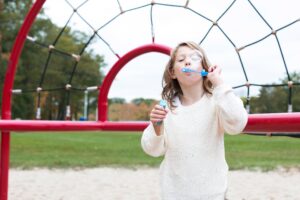My child is also prone to allergies. Every spring, she likes to rub her eyes, rub her nose, and sniffle. At first, I thought it was just because she didn’t sleep well. Later, I realized that she also has spring allergies.
You’re not alone. Every spring, many kids experience symptoms like sneezing, itchy nose, itchy eyes, and more due to sensitivity to pollen. This is what we commonly call spring allergies or seasonal allergies.
What Are Spring Allergies?
Spring allergies occur when a child’s immune system overreacts to pollen, a tiny airborne substance. When the child inhales pollen or it gets into their eyes, it can trigger an allergic reaction.
Common Symptoms of Spring Allergies in Kids
You may notice the following in your child:
- Frequent sneezing
- A runny nose or nasal congestion
- Constantly rubbing their nose or eyes
- Red, itchy, or watery eyes
- Mild cough or itchy throat
- Looking more tired (especially due to poor sleep from nasal congestion)
For some kids, allergies can also worsen asthma symptoms, such as wheezing or difficulty breathing.
How to Tell the Difference Between Allergies and a Cold
| Symptoms | Allergies | Cold |
|---|---|---|
| Fever | No fever | May have a mild fever |
| Type of Nasal Discharge | Clear and watery, lasting longer | Starts clear, then may turn yellow or thick |
| Itchy Eyes | Common | Rarely occurs |
| Duration | Can last for weeks or even months | Typically lasts 7-10 days |
If your child’s symptoms occur every spring and there’s no fever, it’s likely an allergy.
What Can Parents Do?
- Reduce Exposure to Pollen
- Watch the pollen count in weather forecasts
- Limit outdoor activities when pollen levels are high (e.g., early mornings or windy days)
- After going outside, have your child change clothes, wash their face and hands
- Keep windows closed, especially during peak pollen times
- Keep Indoor Air Clean
- Consider using an air purifier if possible
- Regularly wash bed linens and stuffed animals
- If you have pets, keep them clean and groomed
- Consult a Doctor for Medication Recommendations
- Child-safe antihistamines can help alleviate symptoms
- Nasal sprays or eye drops may also be useful
- Never give adult medication to children without consulting a doctor first
- Consider Allergy Testing if Necessary
- If symptoms are severe or persist for a long time, your doctor may suggest allergy testing
- Some children may benefit from long-term desensitization treatment, such as allergy shots
Parent Tips
While spring allergies can be bothersome, there are simple steps you can take to help your child feel more comfortable during this season. Pay attention to symptoms, establish preventive habits, and seek medical advice when necessary. You’re doing a great job, and your child will be able to enjoy spring thanks to your efforts.













